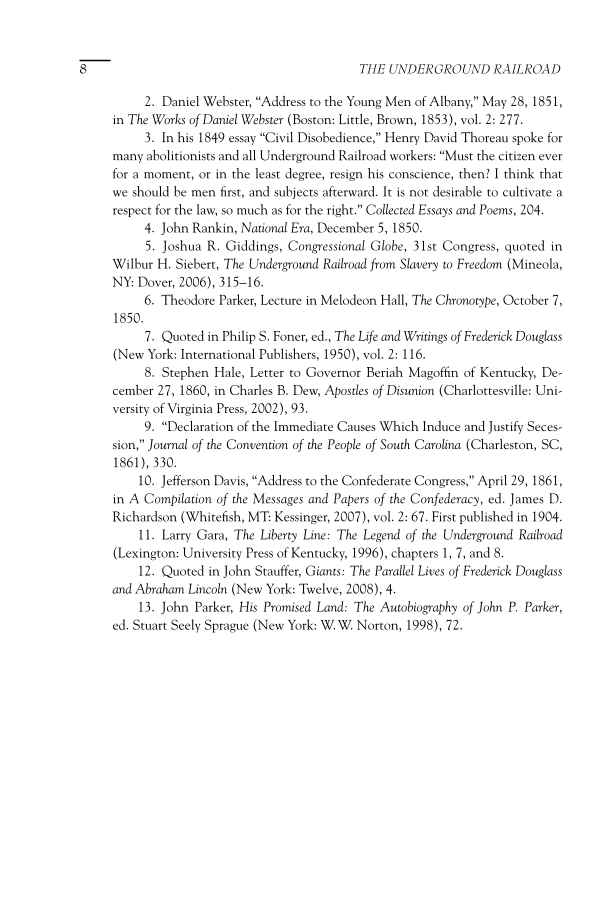8 THE UNDERGROUND RAILROAD 2 . Daniel Webster, “Address to the Young Men of Albany,” May 28, 1851, in The Works of Daniel Webster (Boston: Little, Brown, 1853), vol. 2: 277. 3 . In his 1849 essay “Civil Disobedience,” Henry David Thoreau spoke for many abolitionists and all Underground Railroad workers: “Must the citizen ever for a moment, or in the least degree, resign his conscience, then? I think that we should be men fi rst, and subjects afterward. It is not desirable to cultivate a respect for the law, so much as for the right.” Collected Essays and Poems , 204. 4 . John Rankin, National Era , December 5, 1850. 5 . Joshua R. Giddings, Congressional Globe , 31st Congress, quoted in Wilbur H. Siebert, The Underground Railroad from Slavery to Freedom (Mineola, NY: Dover, 2006), 315–16. 6 . Theodore Parker, Lecture in Melodeon Hall, The Chronotype , October 7, 1850. 7 . Quoted in Philip S. Foner, ed., The Life and Writings of Frederick Douglass (New York: International Publishers, 1950), vol. 2: 116. 8 . Stephen Hale, Letter to Governor Beriah Magoffi n of Kentucky, De- cember 27, 1860, in Charles B. Dew, Apostles of Disunion (Charlottesville: Uni- versity of Virginia Press, 2002), 93. 9 . “Declaration of the Immediate Causes Which Induce and Justify Seces- sion,” Journal of the Convention of the People of South Carolina (Charleston, SC, 1861), 330. 10 . Jefferson Davis, “Address to the Confederate Congress,” April 29, 1861, in A Compilation of the Messages and Papers of the Confederacy , ed. James D. Richardson (Whitefi sh, MT: Kessinger, 2007), vol. 2: 67. First published in 1904. 11 . Larry Gara, The Liberty Line: The Legend of the Underground Railroad (Lexington: University Press of Kentucky, 1996), chapters 1, 7, and 8. 12 . Quoted in John Stauffer, Giants: The Parallel Lives of Frederick Douglass and Abraham Lincoln (New York: Twelve, 2008), 4. 13 . John Parker, His Promised Land: The Autobiography of John P. Parker , ed. Stuart Seely Sprague (New York: W. W. Norton, 1998), 72.
Document Details My Account Print multiple pages
Print
You have printed 0 times in the last 24 hours.
Your print count will reset on at .
You may print 0 more time(s) before then.
You may print a maximum of 0 pages at a time.

















































































































































































































































